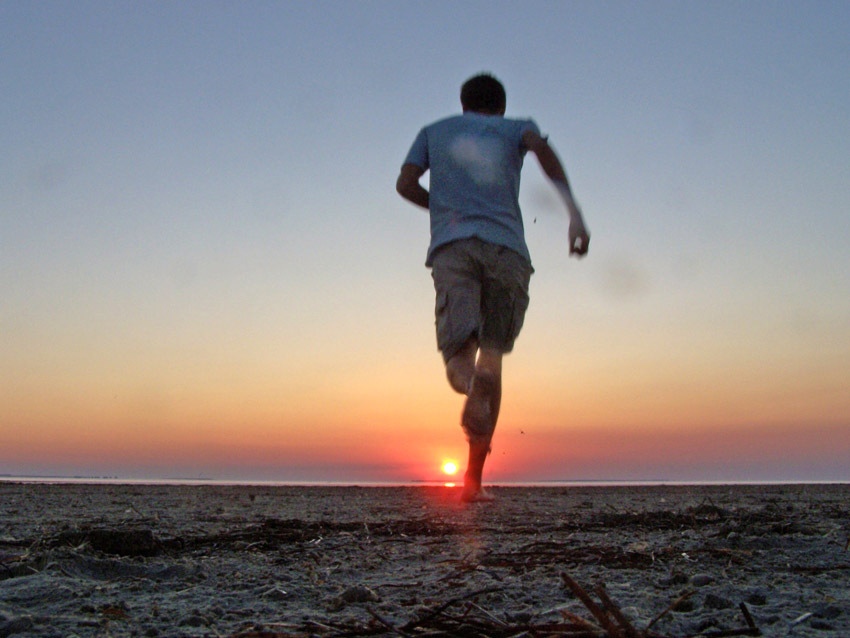Jogging
Jogging is a problem that affects many runners, myself included. As a heavy runner, some rules differ slightly when running. This is often overlooked or forgotten at the expense of the health of the respective runners. In this article, I want to highlight a few things heavy runners should pay special attention to: What does a typical runner look like? Most people would probably imagine something like a slender person with long legs. In fact, the average German hobby and leisure runner is a little overweight. This is certainly not the case. Rather, being overweight is often the reason many people start jogging. This is fine in and of itself, but there are a few special things to keep in mind, especially for beginners.

Overweight can no longer be misunderstood. You don’t have to be fat to fall into this category. With a BMI of 27, I’m still at the end of my last diet (subjectively I’m especially thin and fat during the running season), I’m still technically slightly overweight.
One thing in advance: it’s great to run on the track even as a “heavy” runner and set a goal to become athletic. However, your focus should always be on your health. For this reason, I have put together a few tips for you to look out for if you, like me, belong to the group of not very feathery runners.
1) see a doctor
I advise everyone who starts running to see a doctor and get tested. If you are a little heavier, this applies even more. There are just a few health risks that might otherwise go unnoticed. Either way, do a stress ECG to rule out possible undetected cardiovascular disease.
If you feel any discomfort later on while running, you should see a specialist doctor (again). I know too many people who said “it’s going to work,” but then regretted not going to the doctor earlier.
Especially as a heavy runner, you can be on the safe side with a short doctor visit.
Especially when running with excess weight, the load on the musculoskeletal system is higher, and if the load is incorrect, injuries, increased wear and tear and, possibly, long-term deterioration are possible. Better not risk it.
2) Do a running workout or train with
When running overweight, improper movement and poor running style quickly have a negative impact. As already mentioned, the acting forces and therefore signs of wear are much stronger than those of light runners.
If you are still early in your runner’s life, you should definitely take part in a workout or running training session to develop a good running technique. This makes sense overall, and I recommend everyone (even light runners) do something like this. The more your body weight, the more meaningful this training will be for you.
Tip. It is best to make sure that there is also video analysis during your running workouts followed by recommendations and verification after a few months. It really would be the very first cream!
Even as a seasoned runner, it makes sense to take part in such training from time to time and conduct ongoing analysis. Personal running style changes over time in the same way that physiological requirements change frequently during running. If you are losing weight (by running), the latter is especially important. In addition, over time, “mistakes” may appear that you don’t even notice, but which the coach can pay attention to with a trained eye.
Do a running workout from time to time so you are more likely to get the most out of your running while minimizing your risk of injury.

3) spend a lot of time on your body
Everyone should get used to running. Tendons, ligaments, joints, and the whole body must adapt to new stressful stimuli. It will take several months. For this reason, every beginner should do it slowly at first, so as not to overdo it with speed and distance, and above all, give yourself enough time to regenerate.
When running overweight, it may take longer for the body to adapt to the new load than for light runners. In the end, the acting forces are even greater.
4) Don’t run (immediately) on difficult terrain
Cross, trail and obstacle courses are very popular now. Since a particular runner tends to directly target an event such as a tough muddy. This is also completely normal. I can understand that in the end I started working with similar goals.
Since overweight jogging is especially high, you must get used to running longer and longer distances. Smooth roads and paved forest paths are the best surface with suitable footwear.
Even though it is physiologically possible for most people to recover enough to withstand such a run with very little hard training at the last minute, I recommend waiting until it goes well with “normal” running. Generally, I would wait at least a year from the first run to the first obstacle run.
5) Don’t just run to lose weight, but take risks
Most overweight people start running because they think it’s the best way to lose weight. However, they often tend to overestimate this effect. Your best bet is to read my article on losing weight by jogging. Above all, you should never underestimate the importance of proper nutrition.
In fact, through strength training, you can contribute more to fat loss in the same amount of time. That being said, you will most likely get the specific body that most people want.
This beach body can only be obtained by doing strength training in addition to running in your diet.
Running is a great weight loss sport and is also very beneficial if you do it right. However, you shouldn’t just start running and then rely on it to lose weight.
If you are overweight, you should definitely lose weight. The negative health effects of being overweight not only negatively affect running. In addition to effective strength training and a low-calorie diet, running can support you very well.
6) Be proud and tell others about your success
Moreover, you are overweight and jogging hard, sometimes you feel ashamed, and you don’t tell anyone that you ran.
I know this from myself. When I started running, I was about 100 kg, and it was nowhere near as much muscle mass as it is now (more about my transformation). My first runs were incredibly short and very slow. I did not dare to publish them or even talk about them at all. I had to do just that.
I am convinced that this will help you share your success with friends and like-minded people. It doesn’t matter how small they seem to you. Jogging is not something to be ashamed of, but something you can be especially proud of. You have your first steps, and you need to share them with the people you care about. Anyone who is on your side and wants to support you can find out about it and help you defeat your inner bastard.
7) Pay special attention to the right running shoes
So many aspiring runners choose the first shoe they can get their hands on. To start and try, every sneaker has to go, right ?! No! Please grab a pair of suitable running shoes from the beginning and do your running analysis. Your feet will thank you forever!
Under no circumstances should you try to save some money here and if you’re lucky just buy some sneakers from the discounter. It can go wrong. After all, when you run, forces several times your body weight are acting on your joints. The connection between your feet and the floor should be right for you and your running style. Shoes that are strong and durable also make sense, as higher loads naturally wear out the material more quickly.
By the way, it is rumored that a heavy runner always needs sturdy shoes that support pronation.

8) Buy new sneakers often
In general, the shoe is said to take about 1000 kilometers apart and should no longer be used for running. Change your shoes more frequently when you are overweight.
Personal requirements for the right footwear also change over time. Your running style becomes more stable and safer, and your running technique changes as the weight drops and the experience increases. Sometimes deliberate changes are made (for example, through training).
All this means that your current shoes may not be the best for you in a few months. Therefore, run analysis from time to time to check it and get new shoes every 500-700 kilometers. So be careful.
Your conclusion on overweight running
Great if you want to go jogging to do something for your health, even if you’re overweight. Even as a strong runner, you can do something good for yourself and your health by running. You don’t need to worry, as many runners are (slightly) overweight.
If you follow the guidelines in this article, in addition to general tips for beginners, I am confident that you will quickly achieve initial success without any major health risks.
Fun to run

And don’t forget: your health is your health
